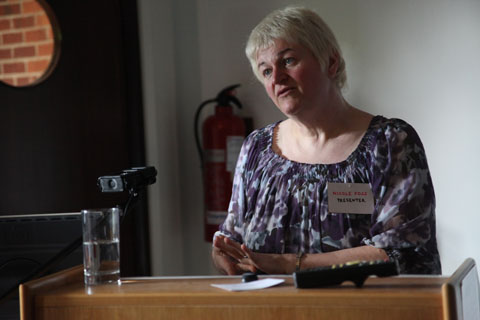
Where Mark has started with personal resilience, it is my turn to follow. This isn’t something I have thought about a great deal, but I do think it is very important. Of course, the first question for me is, “Am I personally resilient?” Or, perhaps, “How resilient am I?”
For starters, I don’t fall to pieces in a crisis, and I can usually see the funny side. When things go wrong, I start thinking, “What can I learn from this? What good could come out of it?” I look around to see how I can help. I guess that's a useful beginning.
When I think of the Transition context for this, two issues come to mind: 1) There is the larger Transition issue of being prepared for a world in which energy is no longer so available, and the prospect that there will be an economic crash, perhaps triggered by limited energy. 2) Then there is the more immediate struggle to build active Transition initiatives, overcoming public apathy and personal differences within the group.
I have been thinking about the first question quite a lot recently, especially triggered by the Stoneleigh talk at the Transition Conference, which has been discussed on this blog and at various local meetings. If you don’t know about it, the title was Making Sense of the Financial Crisis in the Era of Peak Oil. She is predicting a very major financial collapse within the next few years.

So then, how would I cope? I am retired and live on a pension now, but that might go too. At least I don’t have a mortgage. I am as dependent as everyone else on systems totally beyond my control for food, energy, travel, stuff. I am only moderately practical and not particularly strong or physically tough.
In a discussion about this, someone commented, “Transition is my pension.” I agree with that. In a crash, I will need to be working closely with a group of mostly local people who will be looking after each other as best we can, sharing food and transport and whatever. So a major part of personal resilience is being part of a well-functioning local group that is itself highly resilient, that is resourceful and practical. I could make all sorts of contributions to that, from physical work to organising and problem solving.
That makes point 2) above all the more urgent. A local Transition group now seems to me less about creating public awareness in those who don’t know about peak oil and climate change, and more about getting some start to the resilient systems we will need to survive ourselves. A big crash will create the awareness rather quickly.
A resilient group means a lot more than a series of practical projects. It is mostly about how well its members get along. Do we know how to do that? Do we appreciate and acknowledge each other? Can we use disagreements and conflicts creatively? Are we clear about our roles and responsibilities? About who will be doing what and how we make decisions? This is where I now see the cutting edge, and where I have been putting in a lot of effort.
 In a global society based around competition through the market, there are billions of us all working against one another. But if we in Transition are building a world in which we are collaborating to look after humankind and the natural world, then there is only one global collaborative group, of which our little local groups are part. I see the detailed practical skills of understanding each other and working together as our biggest and most immediate challenge.
In a global society based around competition through the market, there are billions of us all working against one another. But if we in Transition are building a world in which we are collaborating to look after humankind and the natural world, then there is only one global collaborative group, of which our little local groups are part. I see the detailed practical skills of understanding each other and working together as our biggest and most immediate challenge.







Great post Gary. Absolutely spot on - we are not islands - I think resilience is a shared responsibility to the greater goal of transition. Nothing is more destructive to groups than personal differences so we need to observe these with great care - not allowing ourselves to lose heart with transition itself, but not ignoring these differences either. We also need to acknowledge the value judgements we ourselves make of others, and how utterly destructive these forces can be. Seeing the best in people is not always easy!
ReplyDelete